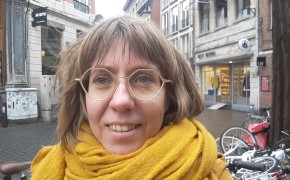An opportunity to outsource repetitive labour processes in view of circular economy development, while providing social employment
AMAi is a day centre offering care and manual employment for people with a distance to the labour market, which has set up one strand of activities around the upcycling of second hand fabrics and tents from the Tomorrow land festival. The main aim of AMAi is to take care of citizens with medical, mental or social issues, by granting them a useful day activity and structure within a professional context. However, within the sewing atelier of AMAi, the target group is making new, fashionable goodies, such as raincoats, lunch wraps and carriers, from old/recovered cloth from the recycled goods shop and from the old banners and flags of the city. Within the city centre, two pop-up shops have opened in order to sell these upcycled goodies. About 50 people are now employed by the city within the AMAi ateliers, and some 8 people are employed through AMAi in private businesses such as the packaging-free store in Mechelen, bakery and an elderly home. AMAi offers to do manual labour for private operators, which is an opportunity for businesses to outsource repetitive labour processes specific to reparation, refurbishment, collection, sorting and recovering processes within the circular economy. The aim of the city is to employ more people in this way and to diversify the offer or kind of work for the AMAi employees. The partners of this initiative are the province of Antwerp, and the businesses or city departments who demand for services from AMAi
Resources needed
On a yearly basis: € 240.000 euros for 3,5 FTE staff members who accompany the workers plus € 64.000 euros of operating costs. The income from orders is only €6.000 per year.
Evidence of success
Almost 60 beneficiaries at this moment. This figure, as well as the productive hours, has increased significantly throughout time. More than a working environment AMAi provides these citizens a safe harbour and access to other city services and talent development, which leads to pride among the beneficiaries to work for the city. 37 different designs have been made now for the upcycling of cloth, and some 40 items are sold every month in the pop-up shops since their opening in November 2019
Difficulties encountered
Providing continuity of work for the target group is a challenge, because of dependence on sporadic orders made by clients. There is no monitoring system or target yet on recycling of cloth, nor on employment within circular economy, as these businesses still have to develop. Not yet known enough.
Potential for learning or transfer
This practice offers a combination of social employment goals and goals of stimulating circular businesses. New work- and care regulations for social employment have been adopted in 2018 by the regional government of Flanders, so the beneficiaries are now having an official statute, recognizing their needs. The Province supports initiatives which provide the target group a structural and full work alternative for an employment contract. Being able to order on manual labour against a low cost within the city, AMAi is providing opportunities for the local development of the circular economy. Especially repair, triage of materials, or other manual activities are key to the circular economy, so employing people in repetitive labour processes through such day centres may be a good solution for the development of circular businesses.
Please login to see the expert opinion of this good practice.
Tags: Circular economy, Empowerment, Jobs, Vulnerable groups, Citizens








